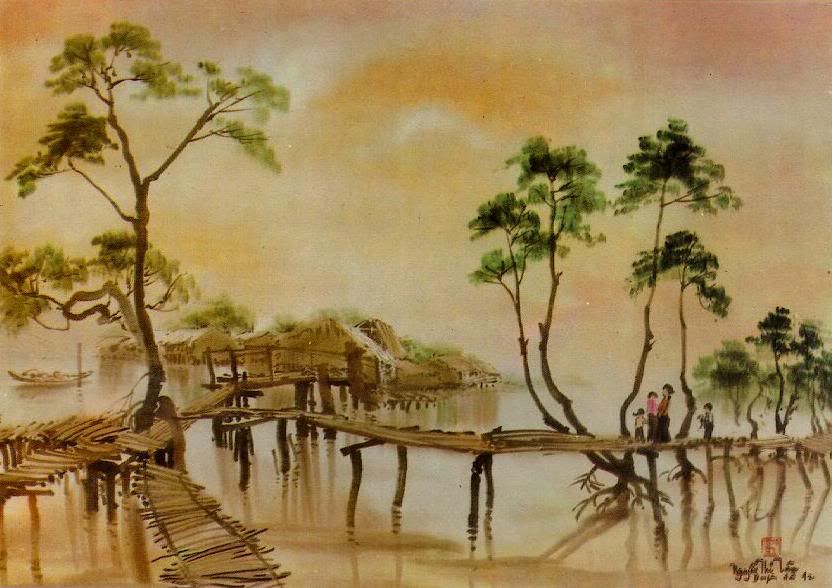Chinese Influence on Japan, Vietnam, and Korea

China, having achieved many great things throughout its history, began to have a great impact on neighboring Asian countries, and many looked to China as an example. Japan, Korea, and Vietnam were some of the most heavily influenced by China, being effected by Chinese religion, architecture, art styles, government, and more. Once Chinese ideas and influence came into contact with these other civilizations, they blended with local practices and culture, which created somewhat similar societies. Japan, Korea, and Vietnam each had strong ties to China as well, and until modern times, preferred keeping their links with China over other links with other civilizations around the world. Still today, it is evident that Chinese culture has had a large impact on these other Asian societies.
Impact on Korea:
Though the Korean people have had many cultural exchanges with China, Korea has kept its own distinct identity throughout history. Chinese influence began to flow into Korea during the earliest Korean kingdom, the Ko Choson (Old Choson)kingdom, which was conquered by the Han dynasty of China. (Korea also had contacts with Japan, but was closer to China at the time.)


When the Han left, Korea split into 3 kingdoms: the Koguryo, the Silla, and the Paekche. Each adopted different aspects of Chinese culture: Koguryo adopted Buddhism, the Chinese code of law, the taxation system, and the bureaucracy. The Silla military followed a code combining Chinese belief systems(Taoism, Buddhism, and Confucianism). Last, the Paekche adopted some Chinese styles for their art and architecture, but their styles were still unique. The Koreans also adopted the Chinese writing system.
Impact on Japan:
The Japanese borrowed many ideas from the Chinese, including their written language, religion, government style, architecture, and art forms. For example, Buddhism and Confucianism, which were important belief systems in China, were adopted by the Japanese but were reshaped to fit Japanese ways of life, creating different Japanese forms of the same religions. The same went for art and architecture, because the Japanese admired Chinese art while adding their own distinct style. Finally, the Japanese modeled their government after the Chinese style by using their own Imperial Court, its bureacracy, and city-planning.

Impact on Vietnam:
The Viets of Vietnam were seen as a group of "southern barbarians" to the Chinese scholars during the Qin dynasty, and the Chinese during this time didn't make much of a difference during their raids of Vietnam, though they did establish trade there. The Vietnamese people saw the benefits of China's technology and achievements, but felt the need to preserve their own identity and didn't want to be swallowed by China's culture. Vietnamese culture was very different than that of the Chinese, and had its own distinct art and literature.


Later, Han rulers came to rule Vietnam, and after their rule the Vietnamese learned Chinese script and memorized classical Chinese texts. Also, Chinese cropping techniques were introduced and food production became more efficient.
(by: Jinan Thomad)
____________________________________________________________________________________________________________
Influence on Korea:
During the 7th century Tang armies conquered much of Korea, resulting in the Korean Silla Dynasty's king recognizing the Tang emperor as his overlord. Tang forces withdrew from the peninsula, and even though Korea paid tribute to China, the Silla rulers were allowed to have a greatly deal of autonomy. Significantly, though, the tributary relationship developed in a great deal of Chinese influence diffusing to Korea. The Silla built a new capital modeled on the Tang capital, Confucian schools were founded, and Buddhism sparked a great deal of popular interest. However, unlike China, Korea never developed a bureaucracy based on merit.
Influence on Japan:
On the other hand, Chinese armies never invaded Japan, and even Kublai Khan's great forces could not overcome the treacherous straits that lie between Korea and Japan. The straits had isolated Japan since its beginnings, and its many islands and mountainous terrain led to separations among people who lived there. As a result, small states dominated by aristocratic clans developed, with agricultural communities developing wherever they were possible. Some Chinese influence, such as Confucianism, Buddhism, and Chinese writing characters diffused to Japan, but it remained unique in many ways. Two examples are:
- Shintoism -This native religion venerated ancestors, but also had a host of nature spirits and deities. Confucianism and Buddhism did not replace Shintoism, and it remained as an important religion in Japan.
- Separation of imperial power from real political power - Even though a Japanese emperor did emerge to rule the various clans, he served as a ceremonial figurehead and symbol of authority. The family that really ran things from 794 to 1188 were the Fujiwaras - who had military might that allowed them to manipulate the emperor. An important divergence from Chinese influence occurred during the late 11th century when the Minamoto clan seized power and installed their leader as the shogun, a military leader who ruled in place of the emperor.
(jamie mitchell, comment 8)
Comments (10)
Joshua Lewis said
at 10:14 pm on Mar 21, 2010
Very good job on this topic. This was a very difficult topic for me but this really helped me understand it better. Very good and helpful information
Christian Gougeon said
at 5:08 pm on Apr 11, 2010
is it safe to say that all three basically took china as an example of what they should try to become?
Monica A. said
at 9:33 pm on Apr 13, 2010
I find poetry and literature to be an interesting way to look at different civilizations, so here's some things i remember about Japan's poetry and literature during this time:
Japanese writing was a simplified form taken from the Chinese. (again, with major influence from China) However, even though the writing itself was taken from China, the works of literature and poetry that the Japanese wrote at this time were very unique in its style. The Tale of Genji by Lady Murasaki was the first novel written in ANY language. (see the Japanese beat China at something. :p). Another unique part of Japanese culture was that women were expected to be just as cultured as men. It was very unique for a women to be expected to have any knowledge, especially during this time.
Monica A. said
at 9:38 pm on Apr 13, 2010
It's easily seen that China had major influence over Japan at this time, among other nations.
When did China's influence in Japan begin to decline???
When the imperial power in Japan began to decline, so did China's influence. China's principles of centralized government and a scholar-gentry bureaucracy had no place where local military leaders dominated. Chinese Buddhism was transformed into a more Japanese religion.
Joseph K. said
at 11:19 am on Apr 18, 2010
Did Chinese culture spread because of conquest or because of other reasons?
Shawn P. said
at 4:26 pm on Apr 25, 2010
So is this like the romans copying the greeks? or is this a case of cultural diffusion?
Tim Bacani said
at 4:41 pm on Apr 25, 2010
@shawn
for japan, i know they wanted to copy the Chinese and they had the Taika Reforms to turn their monarchy into an absolute Chinese style emperor
Felicia Lumen said
at 10:51 pm on May 3, 2010
So China definitely had a LOT of influence over other Asian countries around it. Were they like the British of Asia?
JessicaA said
at 10:53 pm on May 3, 2010
Why did so many places try to adopt Chinese culture?
Felicia Lumen said
at 2:03 pm on May 8, 2010
@ Jessica
I think the reason why so many places wanted to adopt Chinese culture was because it was so successful. China was one of the main leaders in Asia. So by adopting their culture and ways, the other countries hoped to become as successful as them. Another reason was because China sort of imposed their culture on the smaller, weaker countries around them. So some countries didn't really have a choice.
You don't have permission to comment on this page.